- Home
- Lissa Evans
Horten's Miraculous Mechanisms Page 7
Horten's Miraculous Mechanisms Read online
Page 7
“So that’s twenty-nine times twenty-nine times twenty-nine,” said Stuart. There was a pause while he fetched a calculator and tapped in the sum. “Twenty-four thousand, three hundred and eighty-nine possible combinations,” he said, horrified.
Trying them all would be impossible, even if he actually managed to get back into the house again. No, his next task was obviously to find the correct three numbers.
Somehow.
His father crunched a piece of toast. “Do you have any plans for the matutinal hours?” he asked. “By which I mean, of, or related to, or occurring in the morning.”
Stuart nodded. “Yes, I have. I’m going to …”
His voice tailed away as he looked at his dad. His father had such a nice face—never suspicious, never angry, never more than pleasantly puzzled—and Stuart was beginning to feel really bad about how many lies he’d told him over the last few days. On the other hand, if he said, Yes, I have. I’m going to meet the blind sister of your missing uncle’s fiancée in a bingo hall, it wouldn’t sound remotely believable.
“I’m going to go on another bike ride,” he said.
CHAPTER 16
He reached the Gala Bingo Hall at ten to eleven. There was a sign on the sidewalk outside that read EARLY-BIRD SENIOR-CITIZEN SESSION 11 A.M. The doors were already open, and the foyer was heaving with old ladies. Stuart tried to edge in discreetly, but they all seemed very pleased to see him.
“Hello, young man. Here with Granny, are you?”
“Nice to see a young face. Eight, are you? Or seven, maybe?”
He looked around for Leonora, but all he could see was a wall of sensible coats. It occurred to him that he might as well try to do some research while he was waiting, so he smiled back at one of the women and asked if she remembered the Gala when it was a movie theater.
“Ooh, yes,” she said. “Doing a school project, are you?”
“Mmm,” said Stuart.
“Oh, it was lovely then,” she continued. “A maitre d’ at the door, all dressed in red and gold—he’d salute you when you went in—and a great big fish tank in the middle of the foyer.” She turned to her friend. “Lorna, this young fellow wants to know if we remember this place when it was a movie theater.”
“Remember it?” said Lorna, who was all dressed in blue, including her shoes and glasses. “We practically used to live here, didn’t we, Vi?”
“Lived here,” confirmed Vi. “Saw every film they ever showed. We used to sit in the balcony, and I always had a strawberry cone and you always had a bag of toffees.”
“Oh, those toffees,” said Lorna, “I’d forgotten about those. There was a machine just by the ticket office, wasn’t there? You put in threepence and you got a little bag full. Always exactly the same number of toffees.”
“Baker’s dozen,” said Vi.
“Unluckily for my teeth!” added Lorna. Both women laughed.
“Is it still here somewhere—the toffee machine?” asked Stuart.
“Ooh no, love, everything went when it was turned into a bingo hall. I remember them tearing it all out—this place was just an empty shell.”
A bell started to ring, and in the sudden shift of bodies Stuart spotted a guide dog and squeezed through to where Leonora stood waiting.
“It’s me,” he said, putting a hand on her arm. “Stuart.”
She smiled, and the dog sniffed Stuart’s knees suspiciously. On the other side of the foyer, a man in a smart suit flung open the doors into the main hall.
“Have you ever played bingo?” asked Leonora as the sensible coats surged into the hall.
“No,” said Stuart.
The next thirty minutes was a hideous embarrassment. Surrounded by people about seventy years older than himself and sitting next to someone who was actually blind, Stuart thought he might have a chance of winning. He was wrong. The caller announced the numbers at the speed of light, everyone else had a row of at least six bingo cards while Stuart only had one, and he still couldn’t keep up. At one point he was so flustered that he dropped his pen on the floor, and one of the old ladies actually patted him on the head as he scrambled around for it.
When Leonora, who had special Braille cards, won a voucher for a shampoo and perm at a local hairdresser, the caller shouted out, “Let the little lad collect it! Let’s have a big hand for the little feller!” And everyone applauded as he clumped to the front, beet red.
“That was very, very kind of you,” said Leonora when he got back to his seat. “Now, let’s go to the café upstairs here and have a chat.”
She bought him a slice of banana cream pie and they sat at a table by the window. The dog rested its chin on Stuart’s knee while he ate.
“Is the pie nice?” asked Leonora.
“Fantastic!” said Stuart.
Leonora laughed. “You sound just like your great-uncle. That was his favorite word when he was a boy.”
“When he was a boy? You mean you knew him when he was my age?”
“I grew up in the house that I live in now. At the bottom of our yard, on the other side of the wall, was the Horten factory. When they weren’t at school, Tony and his brother Ray—your grandfather— were there all the time, playing in the yard, learning the trade. Well, Ray was learning the trade. Tony was practicing magic most of the time. I wonder whether you look like him. I remember that he had the most marvelous green eyes.”
Stuart looked at her own eyes, blue but sightless. “But—” he began.
“I could see then,” she said. “Never very well, but enough to watch and remember. It wasn’t until I was much older, after I’d left college and started teaching, that I went completely blind.” She leaned forward and ruffled the dog’s ears. “And luckily for me, I’ve got Pluto now,” she said.
“I haven’t got green eyes,” said Stuart. “But I’m very short, just like Tony.”
“Oh, short,” she said dismissively, waving a hand. “Tony’s height didn’t matter. He was short in the way that a stick of dynamite is short. Crackling with energy and ideas. And I can show you exactly what he looked like as a youngster.”
She fished in her bag and brought out a scrapbook. “This was made by my big sister Lily,” she said, and her voice trembled a little. She took a breath. “It was her engagement present for Tony. Have a look at the first page.”
Stuart took the book from her and turned it the right way up. The words Our Story were inscribed in curly writing on the front. He opened it to the first page, and his stomach jolted. There was a faded photograph of a small boy, grinning from beneath the brim of a top hat. It was the very same small boy that he’d seen pulling faces on every single page of the book in the library.
“Is that my great-uncle?” he asked. “The boy in the top hat?”
“That’s him,” Leonora nodded. “That photograph was taken on the day he earned his first wages for magic. He performed at a children’s party and was paid two shillings and sixpence, all in threepences. He was so proud. He called it his magical money and said that he’d never, ever spend it.”
Stuart stared at the picture. Great-Uncle Tony was gripping a wand with one hand, but his other hand was held out toward the camera. In the palm was a cluster of coins.
“Stuart, how did you find me?” asked Leonora abruptly.
“I put a threepence in an old Horten’s weighing machine,” said Stuart. “I know it sounds a bit mad, but that’s what I did. And the needle swung around to seventy-nine, and the words GRAVE STREET FLAT E were scratched into the paintwork next to it.”
He waited to see if Leonora would laugh or scoff, but she said nothing.
“And before that,” said Stuart, feeling reckless, “I put a threepence into a phone booth and it rang even though the line had been cut.”
Again, Leonora was silent.
“And I found those threepences in a trick money box just like the one you showed me, and yesterday I found an old note in the false bottom of the tin, and it’s from Great-Uncle Tony. He
meant it for my father. He wanted him to find the workshop.”
This time Leonora made a little squeaking noise and her cheeks flushed rose-pink. “I knew it!” she said. “I knew Tony was behind it. Did the note say anything else?”
“It said that he had to go away and that he might not be able to get back.”
Leonora nodded.
“Do you know where he went?” asked Stuart.
“No,” answered Leonora. “But I know why he went. He went to find my sister Lily.”
“Why? Where did she go?”
Leonora placed her hand on Pluto’s head, as if to steady herself. “Some people thought that she died in the factory fire in nineteen forty,” she said. “Some people thought she must have left Tony after an argument. You’re probably the first person I’ve ever met who’ll believe the truth.”
CHAPTER 17
“When the war started,” said Leonora, “the Horten factory stopped making its usual items and started making swivel joints for anti-aircraft guns. It was important war work, which meant that your grandfather, Ray, wasn’t called up for the army. He was allowed to stay and look after the factory.”
“And Great-Uncle Tony?” asked Stuart.
“He was below the minimum height requirement.”
“Too short to be a soldier?”
“Yes. So he stayed in Beeton too and became an air-raid warden, and he got on with what he liked doing best, which was inventing new stage tricks. He was really beginning to make a name for himself.”
“Teeny-Tiny Tony Horten,” said Stuart.
“That’s right. People still went to the theater during the war. They were desperate for entertainment, and he had more bookings than ever. And then Ray was asked to travel around to other factories to advise on making swivel joints, and Tony said not to worry and that he’d look after everything while his brother was away.”
“Oh,” said Stuart, sensing doom.
“One evening, Tony and Lily were in the workshop. Night shift had just started in the factory. Tony was rehearsing a new illusion for his next tour. He never bothered with the things that other magicians used, like silly silk handkerchiefs or doves or playing cards. He might not have been interested in the family factory, but he was a brilliant engineer in the tradition of Victorian stage magicians—and there had been one of those in the family, once. Did you know that?”
“The Great Hortini,” supplied Stuart, dimly remembering the librarian droning on about the history of the Hortens.
“That’s right. Well, Tony was inspired by that, and what he built for his shows were beautiful mechanisms: magical doors into nowhere, pyramids with sliding walls, mirrored arches with a hundred reflections. I remember going to a performance and, though I couldn’t see the stage clearly, I could see the glitter and brilliance of it, and I could see Lily disappearing and reappearing in her silver costume, and I could hear the gasps from the audience.”
Leonora stopped speaking for a while and Stuart waited, picking up crumbs from his banana cream pie with a damp finger, idly watching a white dove that had landed on the window ledge just outside.
“I’m sorry,” said Leonora, after another minute. “I started thinking about Lily and Tony. They were both hot-tempered people, forever arguing—two firecrackers in a box—but they loved each other so much. Being with them was like warming your hands on a bonfire. I’ve had a busy life, but there hasn’t been a single day when I haven’t missed them. And as I get older, I seem to miss them more and more.”
The dove on the window ledge clattered its wings and took off again, swooping toward the sidewalk opposite the bingo hall and almost landing on the foot of a man in green trousers, who was standing in the shadow of a shop front.
“So, that evening at the factory,” continued Leonora, “Tony had been working on the Well of Wishes. It was a very elaborate piece of machinery, with a secret compartment for Lily to hide in. The idea was that at the very beginning of the show Tony would drop a coin into the well and wish for a beautiful assistant, and then she’d appear. And at the end, as a little joke, she’d drop in the coin and wish for them both to disappear and off they’d go.
“So he was trying to perfect this, doing the trick over and over again, and Lily was tired—she was working as a nurse at the local hospital during the day, and she wanted to go home. They had one of their arguments, there was a great deal of shouting, and during the course of it the coin that Tony had been using to drop into the well was hurled across the room by Lily, landing somewhere unreachable. And Tony, trying to patch up the argument, said he’d give her a very, very special coin for the trick, and he went to the factory safe and took out the purse of money that he’d earned from that first-ever magic show. It was two shillings and sixpence, all in threepences—ten coins in all.”
“His magical money,” said Stuart, barely breathing.
“He gave Lily the purse, and at that moment the siren sounded. There had already been a couple of false alarms that day, but Tony was an air-raid warden and he took his duties seriously. He went into the main factory to make sure that all the workers entered the shelter, and then he returned to the workshop.
“Lily wasn’t there. Her coat was still on the peg, and her shoes and handbag were beside it on the floor, so he knew she hadn’t left. He called and searched. The air-raid warning was real this time; he could hear the bomber engines overhead and the clatter of incendiary bombs dropping outside the factory. Tony kept searching. He looked in all the secret compartments of all the stage illusions. He shouted Lily’s name. And then he smelled smoke. An incendiary had landed in the gutter on the roof. He climbed up through a skylight to try to dislodge it, but a fire was already taking hold. He hurried back to the workshop and searched again, desperately, frantically. Smoke was beginning to fill the factory, and he could hear the fire engines approaching, bells ringing.
“And then he saw something on the floor. It was the purse. He picked it up, and something made him count the threepences inside. There were only nine left.
“The smoke was so thick by now that Tony could hardly see. He started to grope his way across the workshop toward the Well of Wishes, and then he must have lost consciousness, because the next thing he remembered was waking up outside the factory.
“He’d been rescued by a fireman, and Horten’s Miraculous Mechanisms was ablaze. Every stick of it burned. No trace of Lily was ever found. Plenty of the workers had heard them arguing, and some people assumed that she’d taken the chance to leave. It was easy to disappear during the war—people moved around all the time and you could start again somewhere else, without anyone knowing. But Tony knew that she hadn’t left the factory. He was half mad with guilt and fear. You see”—she paused and moved her lips silently a couple of times, as if trying to work out what to say next—“you see, although he was a magician, he had never actually believed in magic. Everything he’d done had been a mixture of engineering and entertainment, and now a purse full of coins had changed all that he knew, all that he understood. He told me that he was certain that Lily was alive somewhere, and he thought that if he could rebuild the Well of Wishes—if he could recreate it exactly—then he could follow her.
“So he started working secretly. He locked himself away; he gave performances only in order to raise the money to carry on with his search. His only wish in life was to find Lily. And one day, four years after the fire, in the hidden workshop, I think he succeeded.”
“You mean that’s when he disappeared?” asked Stuart.
Leonora nodded.
“But where did Lily go?” he asked. “What did she wish for? Where did the coin take her?”
“I don’t know,” said Leonora. “I’ve spent fifty years wondering.”
“But if I track down the workshop,” said Stuart, “then maybe we’ll find out.”
She smiled, her face looking suddenly very young. “Yes, maybe,” she said, and she held out the scrapbook toward him. “Take this. I’d like you to have it. I d
on’t need it any more, all the pictures are in my memory now.”
CHAPTER 18
Cycling with a scrapbook under his arm wasn’t easy, and halfway home, as Stuart rounded a corner, the book slid out from under his elbow, spinning ahead of him along the road, pages fluttering. A newspaper clipping detached itself from the last page, and Stuart got off his bike and chased the slip of paper along the sidewalk.
As he grabbed it and shoved it back into the book, he realized that he could hear running footsteps behind him and he turned and saw a chunky man in green trousers tearing around the corner at full speed, arms pumping like a sprinter. A second later the man saw Stuart, stopped dead, spun on his heel, and darted back out of view again.
Stuart stood staring. He’d recognized the man. It was Clifford, the trainee magician. Overhead, a white dove flew in a lazy loop and settled on top of a lamppost.
Jeannie’s ordered him to follow me, thought Stuart. She’s hoping that I’ll lead the way to the workshop.
He got back on his bike again and pedaled off very slowly. He took the next left, cycled halfway along the road, then shoved his bike under a parked car and crouched behind it. Sure enough, thirty seconds later, pounding footsteps approached. They thundered straight past and around the next corner. Grinning, Stuart got his bike out again and rode home in the other direction.
He felt full of purpose and energy, and as soon as he’d hidden the scrapbook in his room and had eaten a bag of potato chips, a ham sandwich, four pickled onions, a lump of cheese, two more pickled onions, and another bag of potato chips, he was ready to set out again.
“Whither your current destination?” asked his father.
“The library. Mom said they’d phoned me yesterday about a book.”
“Oh, splendid. Do you mind if I accompany you?”

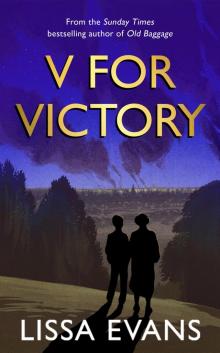 V for Victory
V for Victory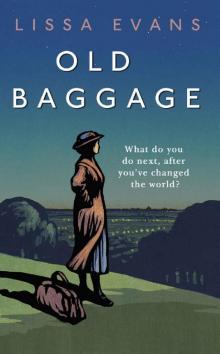 Old Baggage
Old Baggage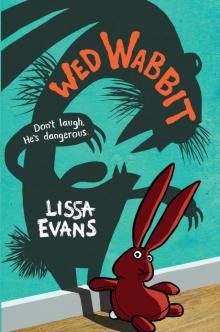 Wed Wabbit
Wed Wabbit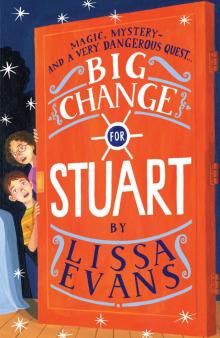 Big Change for Stuart
Big Change for Stuart Spencer's List
Spencer's List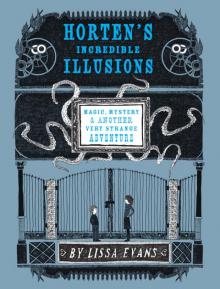 Horten's Incredible Illusions
Horten's Incredible Illusions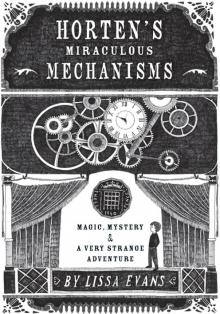 Horten's Miraculous Mechanisms
Horten's Miraculous Mechanisms Their Finest Hour and a Half
Their Finest Hour and a Half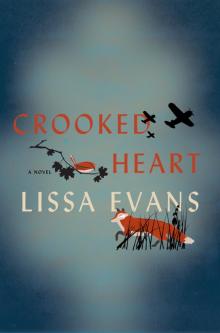 Crooked Heart
Crooked Heart